In our Indie Games Round-up we’ll take a regular look at some of the smaller indie games that either hook us in or get sent our way and talk about the ones we like the most and what makes them great. This week, we’re looking at Hunt the Night and Hotline Miami 1 & 2.
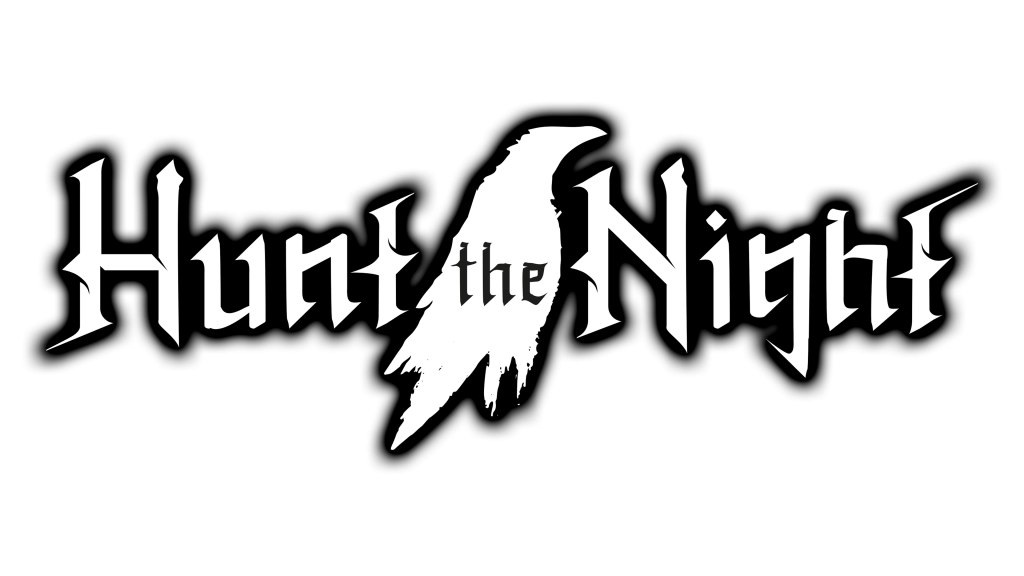
A Souls-like Metroidvania with a gothic aesthetic? Don’t mind if I do.
Hunt the Night is a not-so-little, zippy Action RPG based around slaying progressively more eldritch monsters with an arsenal of upgradable weapons and equipment.
It’s got a lot of the genre staples you can expect from this particular blend of genre-soup – exploration and backtracking that gradually gets wider as you unlock new abilities, progress through bosses, and collect key items. ‘Bonfires’ which refresh all your resources, but also respawn all enemies. Upgradable equipment and changeable spells to give you some adaptability and gameplay style choices.
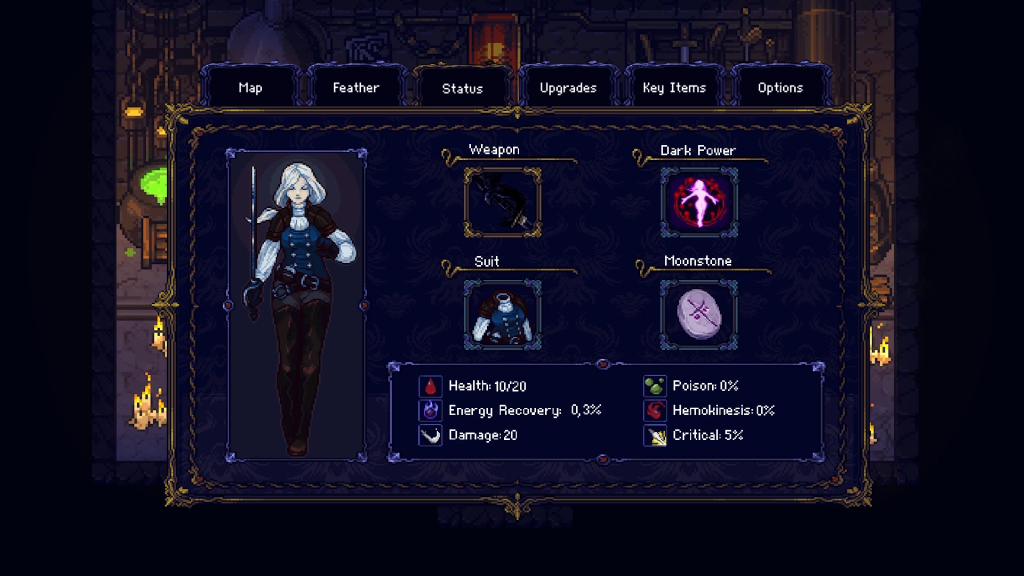
All things that sound good in theory.
Thankfully it’s good in execution, too: Hunt the Night is a tightly crafted game that feels responsive to play and intuitive to veterans of any of the genres while not being unapproachable for those who aren’t. Controls are the foundation of any game, and if they’re off, the entire rest of the experience is shaky. Hunt the Night delivers here: dodging feels good, fluid, and you can use it to cancel attack frames to really eke out last-second dodges or skillfully swoop through attacks to continue your combos unimpeded.
Combat as a whole isn’t terribly deep, but it isn’t mind-numbingly simple either – you’ve got basic melee attacks, limited but versatile ranged attacks, and a changeable spell that operates off a timed cooldown. Your melee reloads your firearms, leading into a really satisfying loop of unloading powerful shotgun blasts, or picking off distant enemies, while darting in to land some hits to do it all over again whilst dropping a spell for good measure. On top of that, your health is rechargable inbetween rests with health vials, Souls-style, and you have access to a high-damaging grenade which can help you out in sticky situations. (I honestly forgot I had it a lot of the time. A classic Skill Issue™)
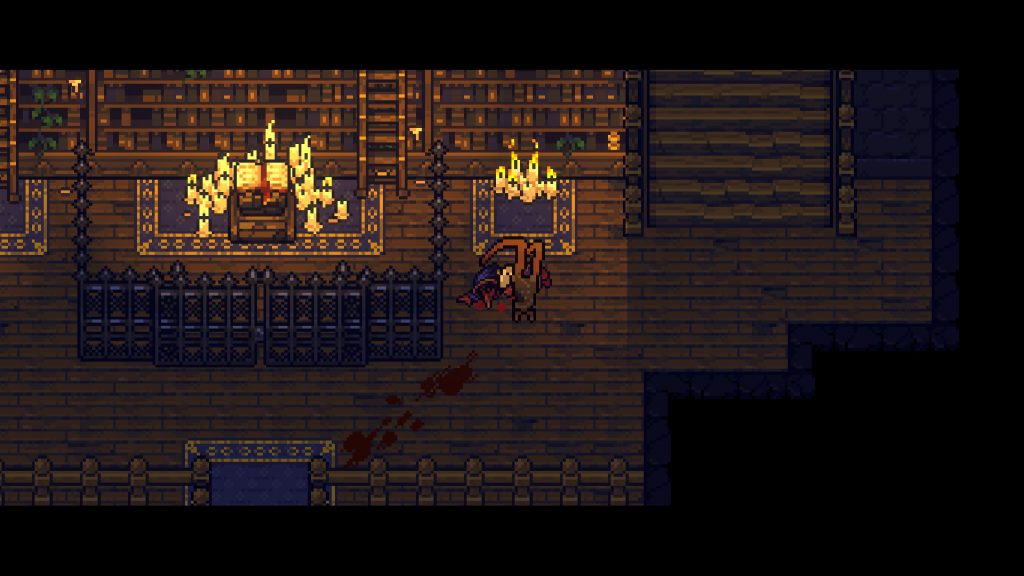
It’s a really satisfying loop, one you can play with a little as you find different spells and equipment, but not too much. Its focus is on mechanical skill, and you can pull off some sick tricks once you start to master them. Dodging through a fireball hurled at you only to pepper a group of mooks with a quick flick of your boomstick is immensely gratifying.
What really keeps the game moving forward is the difficulty, which I found to steadily ramp after the first, rather easy few mobs you meet. I increasingly struggled the more I went through the game. I wouldn’t dare say I’m a fan of punishing difficulty, and I don’t think Hunt the Night is on that level, but it is a challenge. You’ll bash your head off a few encounters and bosses as you hone your skills on them.
There’s some fun to be had with exploration as well – not all the goodies you find are on the straight path set for your progression to the next boss. There’s siderooms, platforms, and some keys and items to find to unlock more equipment for you to play around with. It isn’t too out of the way, but it is missable if you aren’t paying too much attention – or are too lazy to backtrack to go find that Magic Gem you missed earlier.
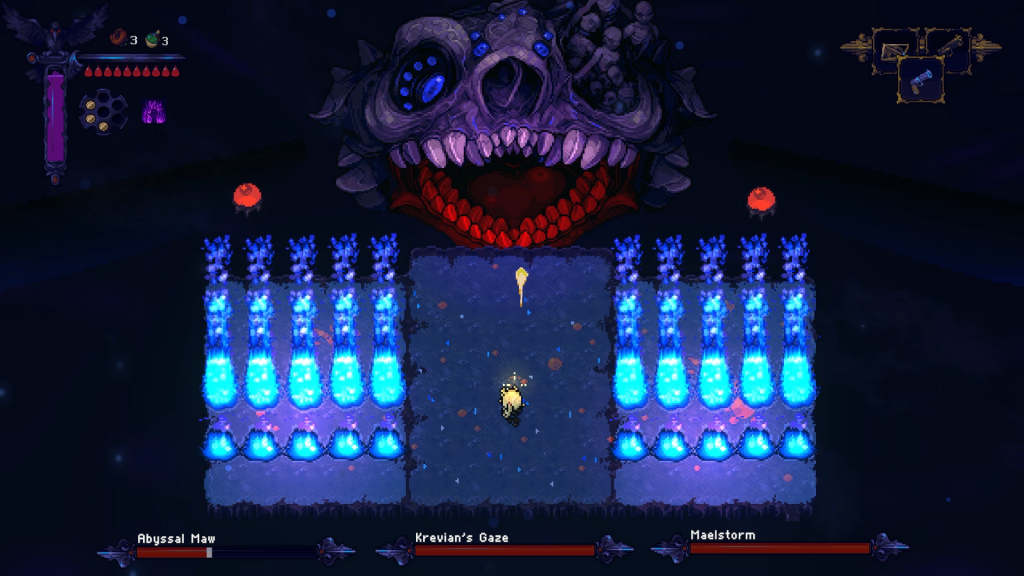
On the visuals & sound front, they’re great. I’m a hopeless sucker for sprites, and this game delivers on them with great design, fluid animation, and a charming look. Bosses vary from Big Zombie Wolf to Burned Witch At the Stake Whose Chained Heart You Must Destroy. It’s suitably gothic, and they nailed the vibe they were aiming for.
Musically, the game pulls these heavy, bombastic orchestral and choir numbers that capture a really epic scale. Heavy strings play menacingly in the background as you tackle boss fights and huge monsters. I hate to make another Souls comparison, but I mean, if you played a single Souls game of any kind, you know the vibe I’m talking about. It’s an awesome style and it fits the tone well.
I’m going to admit my own shortcoming here – there’s lore to the game, and there’s cutscenes and characters, but I just wasn’t that invested in them – though that’s through no fault of the game. I understood and appreciated what I encountered as I was playing, but I just wasn’t that bothered to read every note and lore detail as I usually would. If you’re into it, you’re into it. If you’re not, then there’s a perfectly good game to play regardless.
I’d recommend picking it up off of Steam. It’s a steal for its price for what entertainment you can get out of it. Thanks to DANGEN Entertainment for providing us with a code for this game to review – I had a blast with it.
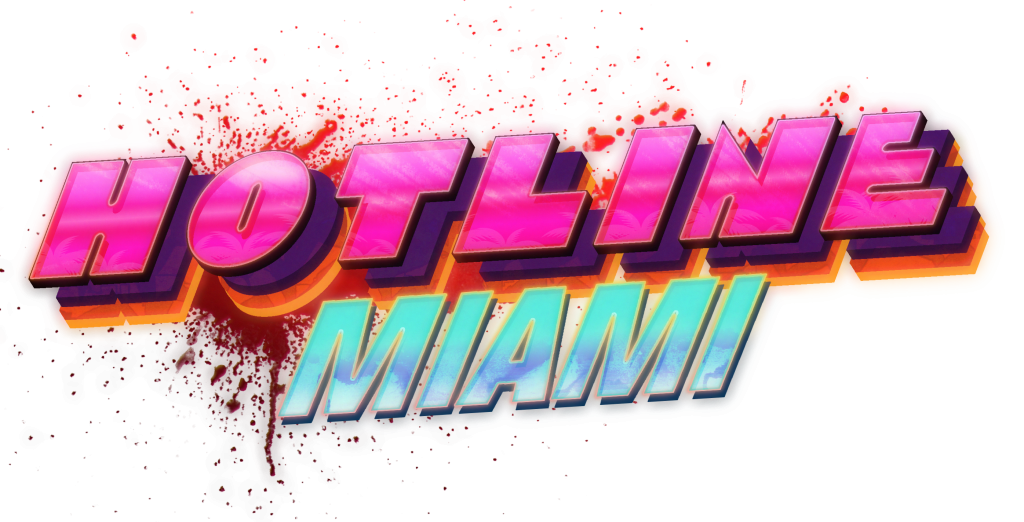

Hotline MiamiandHotline Miami 2: Wrong Number
Because of the busy month I’ve had, we’re going to trek backwards in time to an indie staple I often find myself replaying as a comfort.
Hotline Miami isn’t the game that made me an indie-head; I’d dabbled in the space before its release as a younger teenager, but it is something that shaped me in a way that was beyond the gameplay choices. It introduced me to ‘Drive’ as well, the movie from which it takes heavy inspiration, and which also became one of my all-time favourite films.
It was the raw aesthetic backed up by an utterly revered soundtrack that did it. No other game – aside from the sequel, has had a soundtrack that has completely changed my musical soundscape as Hotline Miami did. I typically want to talk sound and visuals last, to let the raw gameplay have its time, but it’s impossible here. All are so complementary to one another that it feels weak to separate them.
Hotline Miami, stripped down to its core, is a top-down beat ‘em up with a simple goal: kill all the bad guys, and go to the next area. Its story is minimalistic, in the first at least, told through snippets of out-of-combat sequences where you control your character, and with some brief dialogue that you never partake in yourself.
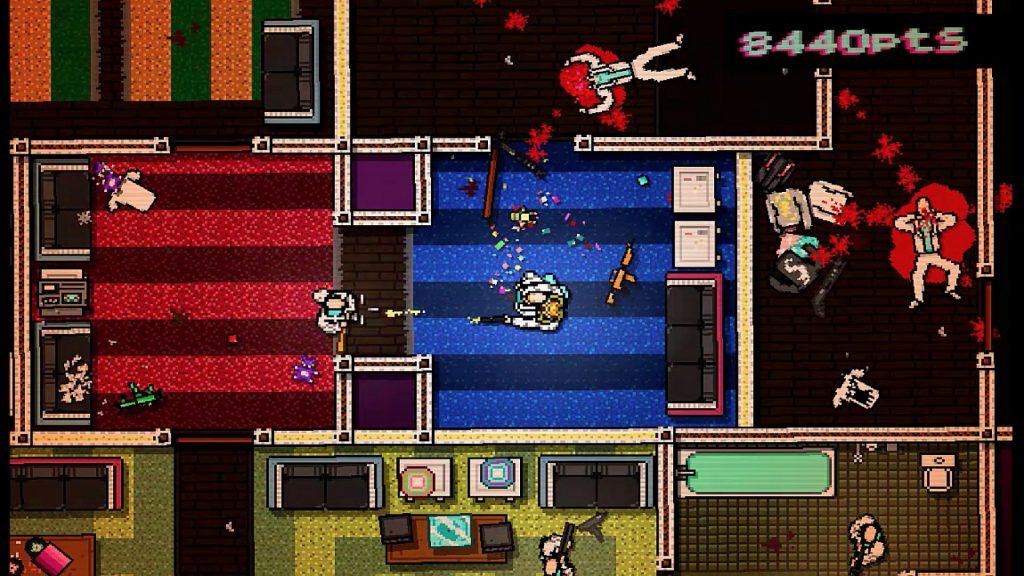
All you do is listen to a message on your answering machine, get in your car, put on your animal mask, and proceed to indulge in horrific ultraviolence. Hotline Miami is set in a strange, neon-pitched world of bright colours, and 80s aesthetics running rampant, all while your ears are blasted with gunshots, sickening impacts of hammer on bone, and the ever-changing melodic synth that soundtracks the entire experience.
Hotline Miami is fast-paced, and lethal – you die in a single hit, but so do most of the enemies, more or less. Restarts are even quicker. Press R, and you’re right back into it, creating this violent loop of die, try again, die, try again, succeed, each attempt pockmarked with which vile method of violence you’ve attempted this time to maximize your score and survival. There isn’t much aside the mechanical loop itself – you can find collectables (and you should for more story insight), and different animal masks to hide your identity that confer different bonuses. Bonuses like tank a single hit, killing enemies when you boot open doors instead of simply knocking them down, or my favourite special ability: Starting with a Power Drill.
You’re rewarded for a mixture of speed and mayhem, graded based on your flair for gory executions and the speed of which you racked them up while staying alive. When enemies don’t die in a single hit, they’re prone, and it leaves them open to an execution of your choosing. There’s no sugar coating it, and the game doesn’t bother, as you commit simply horrific murder that’s abstracted slightly through the artstyle, but not too much to not make you feel the impact. All while you’re painting rooms red with blood, you’re grooving to the soundtrack, absorbed in this blood-fuelled frenzy that, when you reach the end of a mission, simply stops.
Hotline Miami elevates itself with these moments. You don’t just finish a mission, get a cutscene, and move on to the next. You have to walk back through the rooms you gored your way through, with only a low, disconcerting drone buzzing in the background, as if the adrenaline has worn off and the dissociation seeps back in. It adds eerie emphasis to what you’ve done. You hurt people. You enjoyed it. You’re a bad person.
And the game reflects on this a lot.
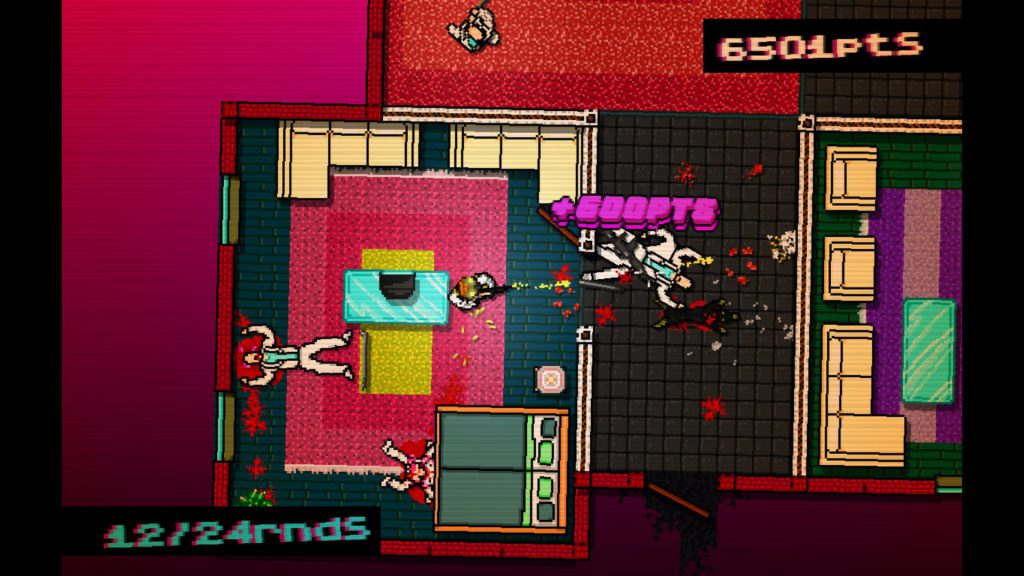
In the second installment, things get a little different. No longer are you a silent protagonist, but several speaking protagonists, all who, in some way, are affected by the events of the first and stuck in the cycle of ultraviolence.
Each character has their own ability and quirk, too numerous to list them all aside my favourite, which is Evan. Evan is a journalist obsessed with the events of the first game, and plays entirely non-lethally. He knocks people out, breaks their arms, and dismantles their guns, but he won’t kill… unless you drive him to it. Evan can beat people unconscious, and the player can force him to take it too far until he says fuck it and starts doing it on his own. There’s no mechanical benefit to this. You get more score by playing non-lethally in fact, but you can do it. His levels are the most fun, in my opinion, and he has some of the best music to go with it. (Run, by iamthekidyouknowwhatimean is easily one of my favourite tracks. It slaps.)
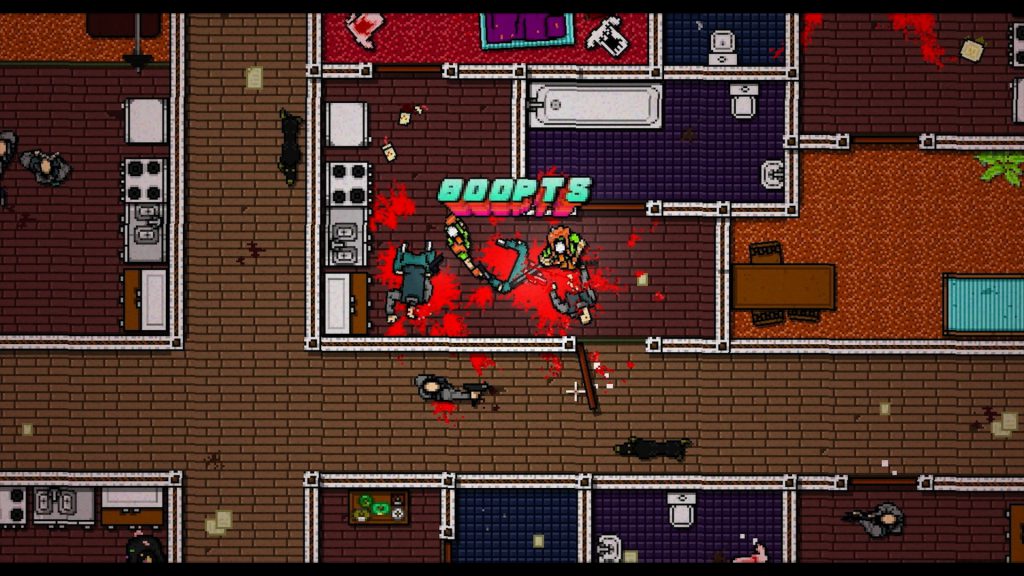
Aside from that gameplay tweak, it’s still mostly the same experience. There’s a little more frustration with an increased inclusion of firearm enemies, and bigger maps that let them shoot at you off-screen, but it’s nothing major. The soundtrack received an upgrade, something that is mind boggling given the quality of the first, and it’s filled with banger and banger that’s complemented with equally banging levels. Seriously, it’s hard to deny the utter charm this game has on its sound alone, and I follow each artist that appeared in this game now because of it.
If you haven’t ever played Hotline Miami, pick up both games and give them a try. They’re some of the best out there, even if they are coming up to 11 and 8 years old now respectively.
Have any questions or feedback? Drop us a note in the comments below or email us at contact@goonhammer.com.


